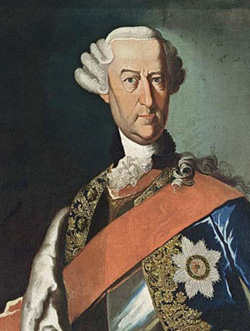Philip of Hesse-Darmstadt facts for kids
Philip of Hesse-Darmstadt (born July 20, 1671, in Darmstadt – died August 11, 1736, in Vienna) was a German prince. He was also a high-ranking military leader, known as an Imperial Field Marshal, and later became the Governor of Mantua.
Contents
Philip's Early Life and Career
Philip was a younger son of Louis VI, Landgrave of Hesse-Darmstadt. His mother was Elisabeth Dorothea of Saxe-Coburg.
Philip joined the military and fought for the Habsburg family. The Habsburgs were a very powerful royal family in Europe. He took part in the War of the Spanish Succession. This was a major war fought to decide who would rule Spain.
In 1708, Philip became a Field Marshal. This meant he was a top commander in the army. He led the Imperial troops in Naples, which had just been taken over.
Governor of Mantua
After the war ended in 1714, Philip received an important new role. With the help of Prince Eugene of Savoy, he became the governor of the Duchy of Mantua. A governor is like a ruler who manages a region for a king or emperor. Philip stayed in this important position until he passed away.
Philip's Love for Music
Philip was a great lover of music. He enjoyed supporting talented musicians. When he was in Naples, he became a patron of the composer Nicola Porpora. This means he helped and supported Porpora's work.
Later, when Philip was the governor of Mantua, he hired Antonio Vivaldi. Vivaldi became the Maestro di Cappella (music director) for Philip's court. Vivaldi even wrote an opera called Tito Manlio for Philip. It was meant to celebrate Philip's wedding, but the wedding never happened.
Marriage and Family
On March 24, 1693, Philip married Marie Therese of Croÿ. For this marriage to happen, Philip had to become a Catholic.
Philip and Marie had five children together:
- Joseph (1699−1768), who became the Bishop of Augsburg.
- Wilhelm Ludwig (born 1704), who sadly died when he was young.
- Theodora (born February 6, 1706 – died January 23, 1784). She married Duke Antonio Ferrante Gonzaga in 1727. They did not have any children.
- Leopold (1708–1764), who also became an Imperial Field Marshal. He married Enrichetta d'Este from Modena in 1740.
- Charles (born 1710), who also died very young.
See also
 In Spanish: Felipe de Hesse-Darmstadt para niños
In Spanish: Felipe de Hesse-Darmstadt para niños
 | Stephanie Wilson |
 | Charles Bolden |
 | Ronald McNair |
 | Frederick D. Gregory |


